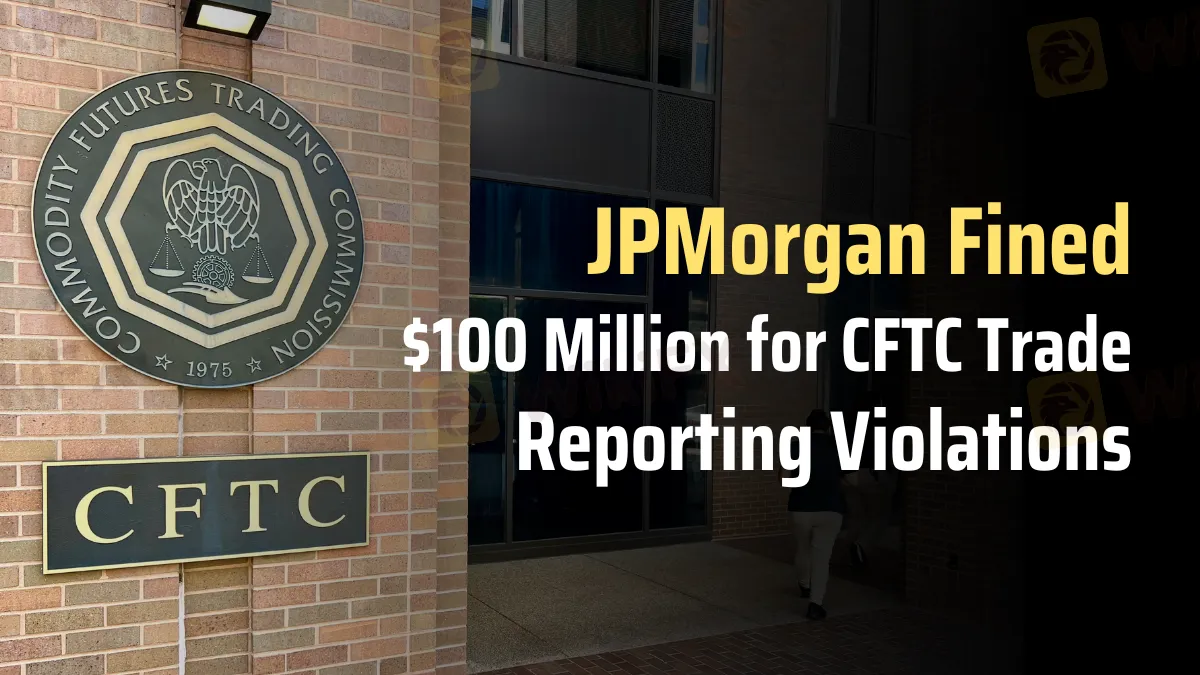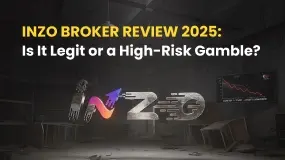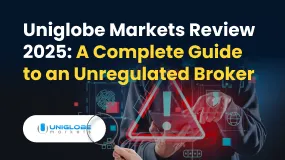简体中文
繁體中文
English
Pусский
日本語
ภาษาไทย
Tiếng Việt
Bahasa Indonesia
Español
हिन्दी
Filippiiniläinen
Français
Deutsch
Português
Türkçe
한국어
العربية
CFTC Fines JPMorgan $100M for Reporting Violations
Abstract:JPMorgan admits to breaking CFTC rules, paying a $100 million fine for trade reporting lapses dating back to 2013.

On Thursday, the U.S. Commodity Futures Trading Commission (CFTC) said that JPMorgan Chase & Co. (JPM.N.) had admitted to breaking its laws surrounding trade reporting failures and had agreed to pay $100 million as a fine.
JPMorgan discovered significant gaps in its order and trade data monitoring, some dating back to 2013, which led to the revelation of the infractions in June 2021. The regulator concluded that these disparities led to the bank's failure to comply with the CFTC-required trade data reporting standards.
A JPMorgan representative would not respond specifically, but they did refer to previous remarks in which the bank admitted to itself that it had reported the infractions. The bank found no wrongdoing and emphasized that consumers had not suffered any damage.
The CFTC has accomplished much with this settlement, which involves an acknowledgment of misconduct. Companies accused of misbehavior are discovering that the regulatory body is becoming more and more keen on confessions of guilt in settlements. This initiative aims to increase openness and accountability in the financial industry.
In both civil and criminal cases, financial corporations usually avoid making such confessions because of the extra expenses that may come from private litigation. However, the CFTC's enforcement head and the Democratic CFTC commissioners have been quite clear that these confessions are necessary to hold companies accountable.

Commissioner Kristin Johnson lamented the frequent conclusion of enforcement proceedings without addressing the underlying errors, wrongdoings, or compliance breaches in her remarks delivered on Thursday at the JPMorgan settlement. In her remarks, she emphasized how these kinds of confessions help cultivate a compliance and responsibility culture in the banking sector.
This example illustrates the challenges regulators face in guaranteeing the implementation of compliance regulations by large financial institutions. JPMorgan's blunders went undetected for years due to the difficulties of monitoring and ensuring that everyone is following the regulations when it comes to transaction reporting. The severe penalty and admission of guilt aim to convey to other businesses the importance of strict compliance and discourage them from engaging in similar activities.
The CFTC's emphasis on eliciting confessions of guilt, even when financial firms resist, reflects a change in regulatory enforcement techniques. The agency's goal in obtaining these confessions is to encourage honesty and openness in the financial markets, as well as discourage such infractions in the future.
This case's verdict could establish a standard for the treatment of trade reporting infractions and affect subsequent regulatory actions and settlements. Due to the elevated risk of public confessions of misconduct and heavy fines, financial institutions may have to reevaluate their strategy toward enforcement and compliance activities.
The CFTC's actions in the JPMorgan case underscore the continuous need for responsibility and attention as the financial industry continues to maneuver through the intricacies of regulatory compliance. The settlement not only corrects the identified infractions but also clarifies the consequences of non-compliance with regulations.
Last but not least, JPMorgan's $100 million fine and admission of breaking CFTC transaction reporting regulations demonstrate the CFTC's commitment to regulating compliance and enhancing accountability in the financial sector. The case highlights the need for strong compliance systems and the consequences that might arise from failing to conform to regulations.
You may access all related news here.

Disclaimer:
The views in this article only represent the author's personal views, and do not constitute investment advice on this platform. This platform does not guarantee the accuracy, completeness and timeliness of the information in the article, and will not be liable for any loss caused by the use of or reliance on the information in the article.
Read more

Amillex Global Secures ASIC Licence for Expansion
Amillex Global gains ASIC AFSL licence, boosting FX and CFDs credibility. Expansion targets Asia, Australia, and institutional trading growth.

Inzo Broker Review 2025: Is It Legit or a High-Risk Gamble?
When you ask, "Is inzo broker legit?" you want a clear, straight answer before putting your money at risk. The truth about Inzo Broker is complicated. Finding out if it's legitimate means looking carefully at its rules, trading setup, and most importantly, the real experiences of traders who have used it. The broker shows a mixed picture - it has official paperwork from an offshore regulator, but it also has many user warnings about how it operates. This review gives you a fair and fact-based investigation. We will break down all the information we can find, from company records to serious user complaints, so you can make your own clear decision.

INZO Broker No Deposit Bonus: A 2025 Deep Dive into Its Offers and Risks
Traders looking for an "inzo broker no deposit bonus" should understand an important difference. While this term is popular, our research shows that the broker's current promotions focus on a $30 welcome bonus and a 30% deposit bonus, rather than a true no-deposit offer. A no-deposit bonus usually gives trading funds without requiring any capital from the client first. In contrast, welcome and deposit bonuses often have rules tied to funding an account or meeting specific trading amounts before profits can be taken out. This article gives a complete, balanced look at INZO's bonus structure, how it operates, and the major risks shown by real trader experiences. Read on!

Uniglobe Markets Review 2025: A Complete Guide to an Unregulated Broker
Uniglobe Markets claims to be an online trading company that offers many different types of investments, including foreign currency and raw materials. The company tries to attract traders by offering high leverage, different account options, and popular MetaTrader trading software. However, there is one major problem: the company does not have proper regulatory oversight. This creates serious concerns about the safety of clients’ capital and whether the company operates honestly. Read on to learn more about its regulatory status.
WikiFX Broker
Latest News
Is Fyntura a Regulated Broker? A Complete 2025 Broker Review
Zetradex Exposed: Withdrawal Denials, Account Freeze & Bonus Issues Hurt Traders
Is Forex Zone Trading Regulated and Licensed?
PINAKINE Broker India Review 2025: A Complete Guide to Safety and Services
Exness Restricted Countries List 2025 Explained
Is Uniglobe Markets Legit? A 2025 Simple Guide to Its Safety, Services, and User Warnings
Is Inzo Broker Safe or a Scam? An Evidence-Based Analysis for Traders
WikiEXPO Dubai 2025 “Welcome Party” Kicks Off Tonight!
He Trusted a WhatsApp Group and Lost RM659,000
Moomoo Singapore Opens Investor Boutiques to Strengthen Community
Currency Calculator



